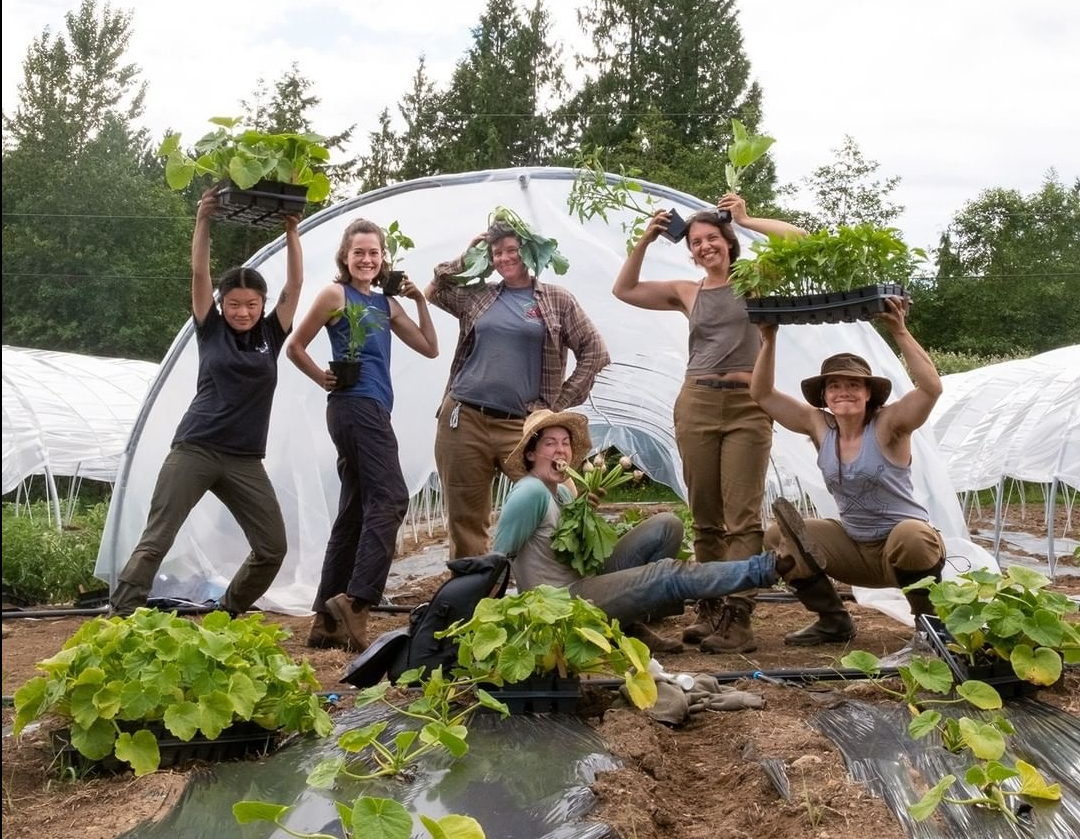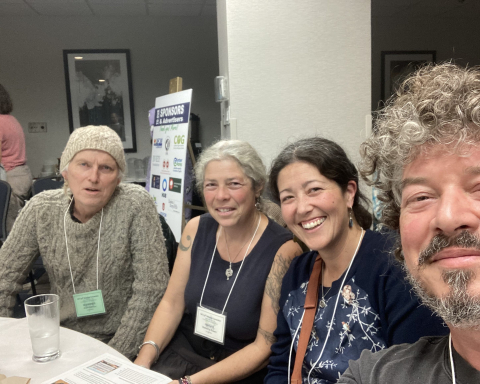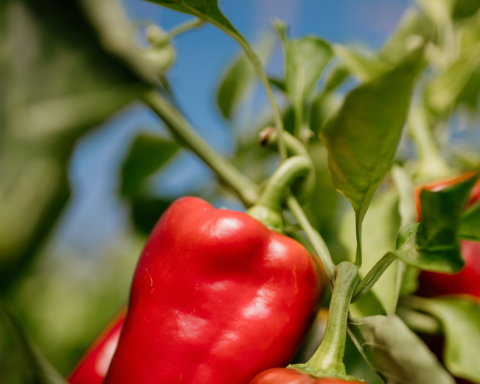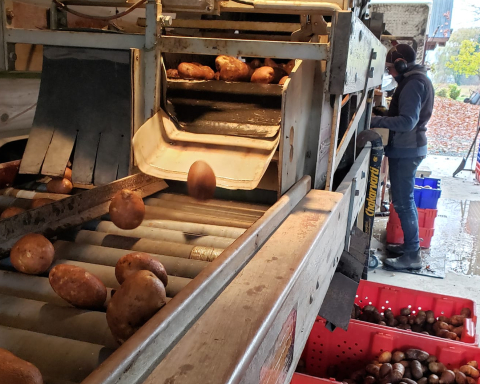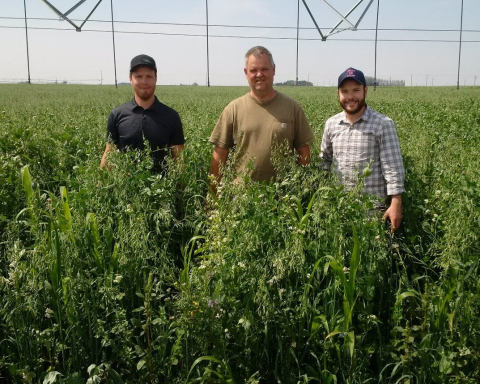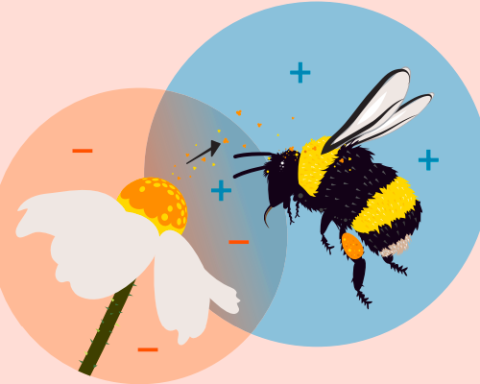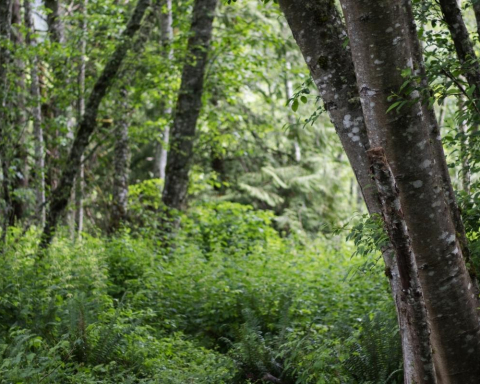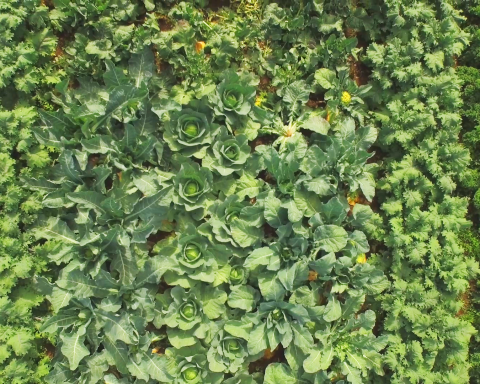Digging into Community
Darcy Smith
Mel Sylvestre has been farming for almost 20 years, and she’s pretty sure she’ll never run out of lessons learned. From last year’s heat dome, to this year’s cold, wet weather, to figuring out just what type of kale customers want, every farming season brings new challenges—and new opportunities.
She farms with Hannah Lewis, her “partner in life, partner in business,” at Grounded Acres Organic Farm on what is today known as the Sunshine Coast. Of their five-acre property, “about two acres, give or take, is farmed in some way.”
Mel and Hannah grow mixed vegetables and have about 100 laying hens, and they get their food to their community through the Sechelt Farmers’ Market, their farm stand, local restaurants, and a collaborative community box program put together by a local organization.
The vision for Grounded Acres was to open up an acre of land and grow from there. They knew they could make enough revenue out of an acre to keep them going, and build from there wisely. They were also keen to learn what people wanted in their new community. “We did a lot of market research,” Mel says, “Our first year we did a blind shot in the dark—we grew as much and little as we could of everything and let things fly, so we could see what the enthusiasm was for. In one region everyone wants green curly kale, in another people want Lacinato kale, and you don’t know why.”
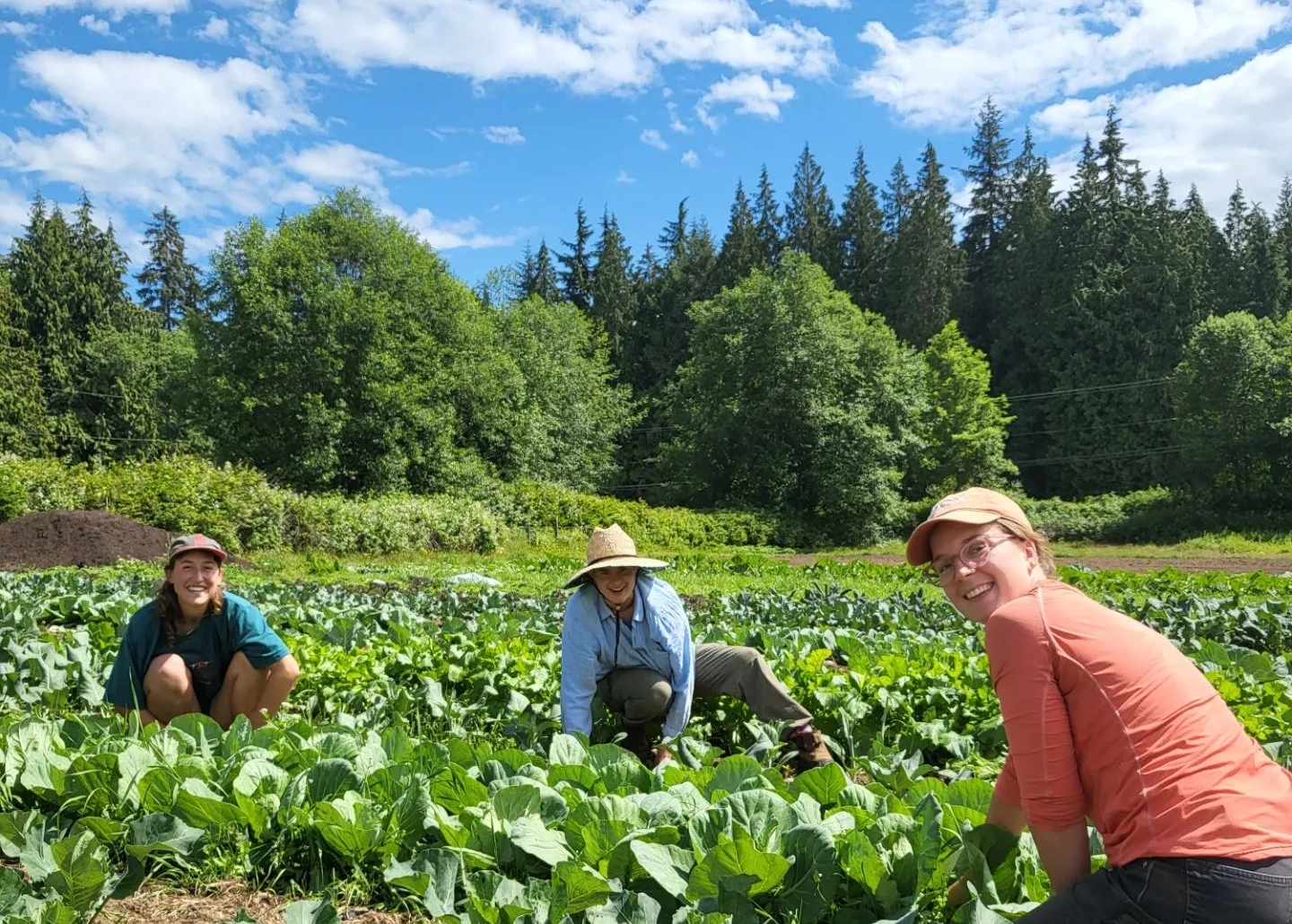
As they get to know their community, Mel and Hannah are also learning the land, which was first opened up over a century ago. First a strawberry farm, then planted in potatoes, it had been 30 to 50 years without having tillage of any sort when they arrived. The land isn’t classified as agricultural soil: it’s class four, or with improvement class 3, loamy sand. Mel says “it’s extremely sandy, and in some parts extremely rocky. In other parts, folks a century ago did the work of removing rocks.”
The good news is Mel is familiar with improving soil. Before moving to the coast, both Mel and Hannah spent almost a decade working at UBC Farm, which has the same soil class. “We came with a shovel when we visited the property. I dug a hole and said, ‘Ah, same soil’.”
Mel originally trained as a musician and sound tech, but when the industry began turning to technology and opportunities dwindled for sound techs, she landed on an organic farm in the outskirts of Montreal teaching children. Despite being raised in the middle of cornfields and dairy cows, she hadn’t been interested in farming until, she says, “I was watching people in the field and thought, ‘Hey, that looks fun’.” One day, they needed help, so Mel “picked up a hoe, went out and helped, and fell in love.” From there, she got another farm job.
Sometimes, Mel says “I wish I had started with an apprenticeship, or working more intentionally on the farm. Things just kept happening, and life brought me from one farm to another.” She ended up in BC in 2005, and farmed with Saanich Organics on the island for six seasons.
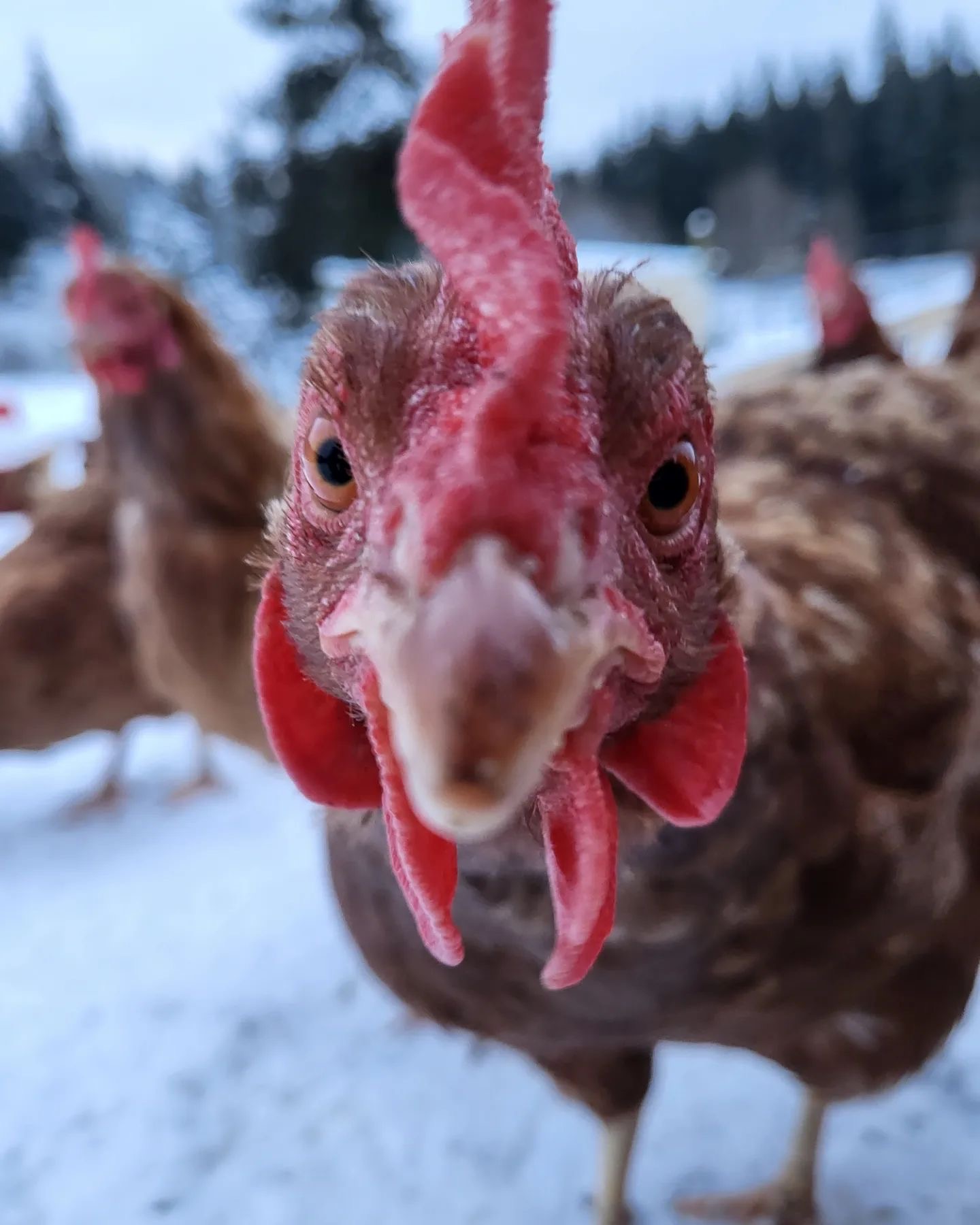
Eight years into her farming journey, she had a window where she could return to university, and studied plant and soil science at UBC. That led her to UBC Farm, where she “discovered a new love, teaching and helping other folks getting into farming.” UBC farm is also where Mel had the opportunity to get into seed production.
UBC Farm is where she found a different kind of love. Hannah was already working in the Indigenous garden at UBC Farm when Mel arrived, but it took them a year—and realizing they were neighbours—before they started connecting. “We didn’t overlap much at the farm, our rhythms in the day were quite different, but we discovered we lived a block from each other, and every time I was taking the 99 bus from East Van she was on the bus. We call it a 99 romance—the 99 brought us together.”
Mel knew she didn’t want to stay in the city long-term, but Hannah was an educator by training. While she really liked gardening, Hannah wasn’t sure how she felt about farming—until she took UBC’s farm practicum and discovered she also loved working the land.
But, Mel says, “what Hannah loved even more was the Sunshine Coast. In my head I thought I was going to go back to the island where my community was, but she convinced me.” They started looking for property, and, Mel says, “I started developing my relationship with the land here.”
It took them three years to find the right piece of land, and by then Mel and Hannah had new twins along for the ride. “We have the lucky situation, the privilege, of having family that invested in our land,” which, Mel says, “was a life saver in the start-up of this business.” Hannah’s mother sold her condo in Vancouver and moved with the young family in order to help them buy the property. “Having the grandchildren in the picture helped.”
Mel is “thankful for the years I spent working on other farms. It’s a blessing and curse. I knew what I needed to be successful, but the curse was I knew how much money it would cost.” They started with zero savings, and Mel knew they would need $100 thousand in financing for the first year to even be able to make their loan payments. “That was the barebone minimum. It seems like a lot of money but it was just barely what I knew we needed to be resilient and get through those first few years, as well as be healthy for our family. We’re not 20 anymore,” Mel says. “We have twins and they’re two years old, and we had a lot of infrastructure to put in place: irrigation, greenhouses, washing station, cooler, workshop. There was a lot that needed to come together to make the farm possible.”
With a solid business plan, clear vision, and the confidence that comes from experience, they went in search of funding—and an angel investor from the community “came out of the woodwork, believed in us, and lent us the money that we needed,” Mel says.
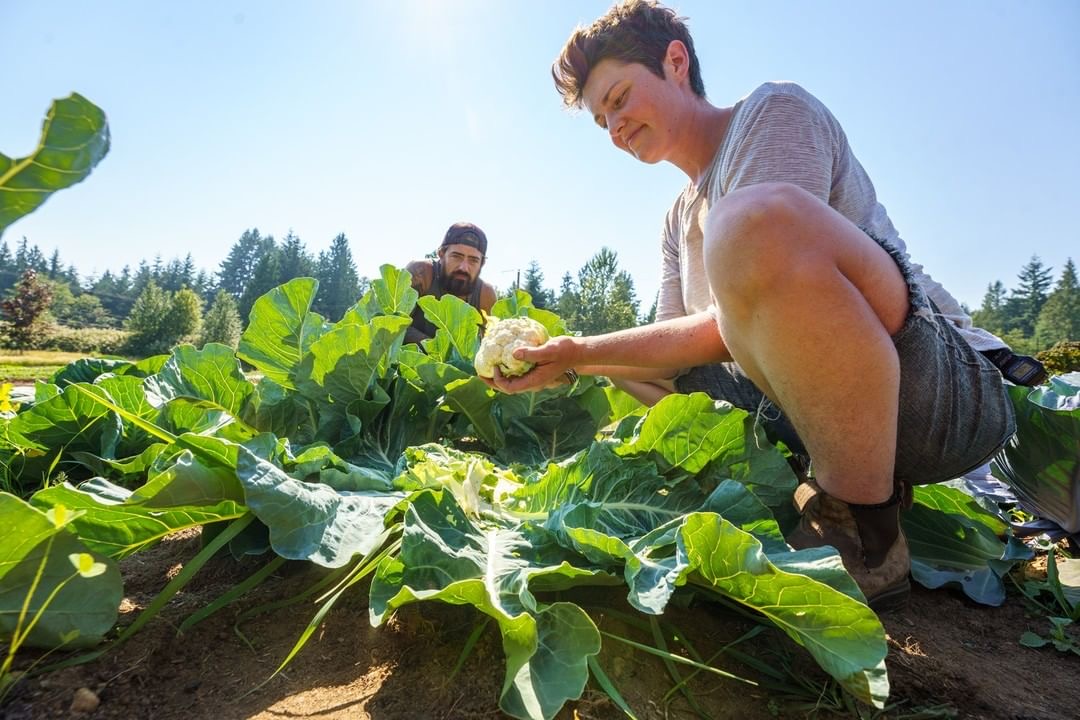
Mid-way through their second season on this piece of land, Mel reflects on how lucky they’ve been, despite a tough year. Crops are three weeks behind, and some have been lost due to weather and pests. “All the things from a cold wet spring,” Mel says. “That’s the name of the game. Every farm has pluses and minuses, and depending on the season, you’ll lose some and gain some.” They have sandy soil, so the heat dome—and accompanying water restrictions—was harder. The sandy soil helped them out this spring, while nearby farms are on clay soil, which never drains. “I feel for the beginners right now. The last two to three seasons were uniquely hard. It’s next-level hardship for farming.”
Mel has the “old equation” in her head, from when she was brought up to be a new farmer. Once upon a time, the first three years were supposed to be tough, and starting in years four to five, “it should be even keel, you should have your system down and understand the land enough to play around.” That magic three-to-five-year number is because “even if you know what you’re doing, there are still things to learn, on the land, in the area, what’s the pattern here, why aren’t the cover crops growing. There’s lots to troubleshoot.” But, Mel says, “that’s not the way it is any more. It could be year 10 before you start to feel like you’re coasting…”
At Grounded Acres, they’re “still really in the deep of it,” learning what their customers want, what ingredients chefs are looking for—there’s lots to figure out. But there’s good news: “one thing people have said even before we moved here, if you grow it, it will fly.” Even before the pandemic, young families were leaving the city and moving to the Sunshine Coast. Between the young families and established residents, there’s high demand for fresh produce. Marketing their product on the coast “has been a fairly easy ride compared to other regions I’ve worked in where there are a lot of other market gardeners per capita,” Mel says.
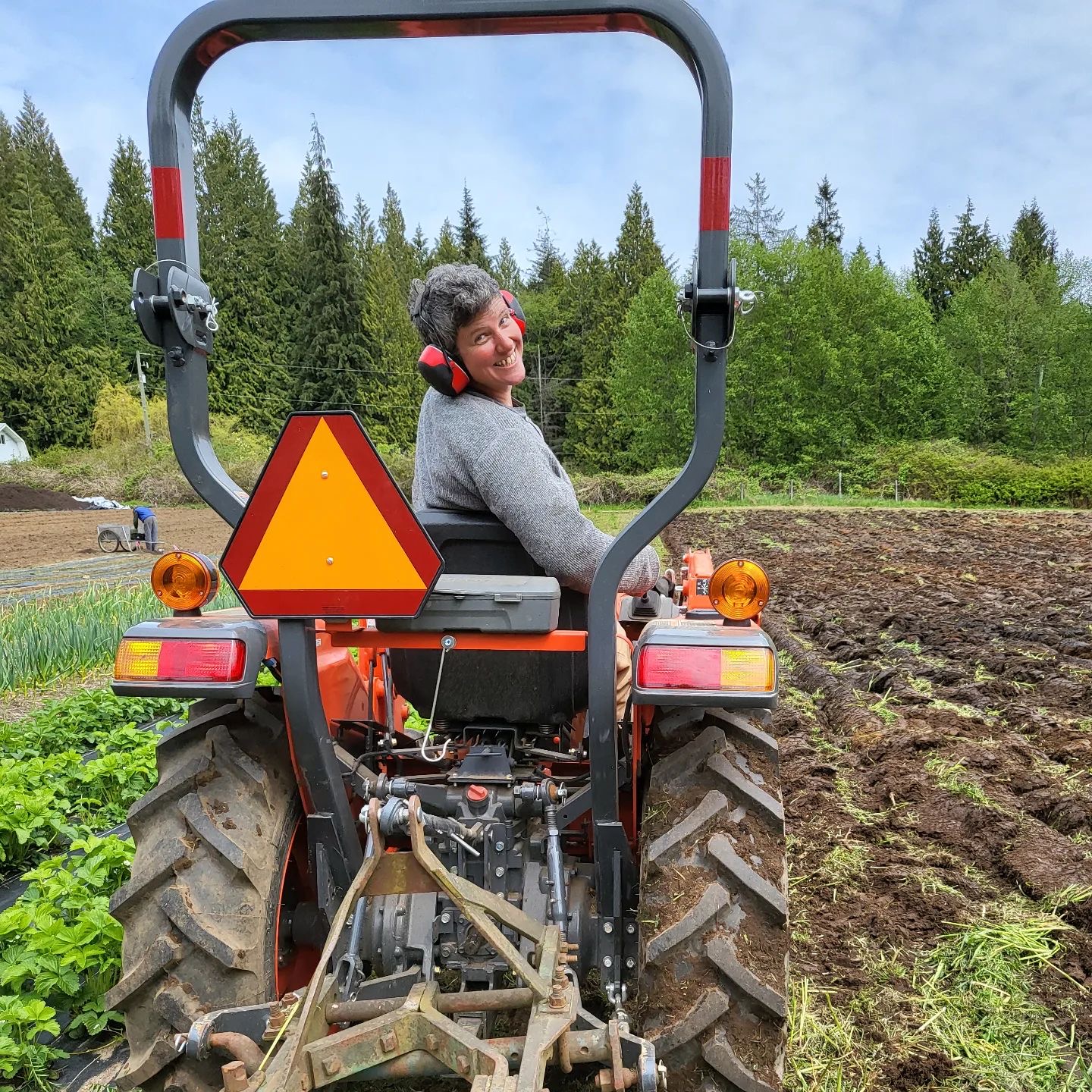
Credit: Grounded Acres Organic Farm.
As it turns out, on the Sunshine Coast everyone wants curly kale, but that hasn’t stopped Mel and Hannah from planting a variety. “We love the diversity. One will sell more, but there’s going to be a reason why we’re glad we planted the other,” says Mel. “Siberian kale is not my favourite in the summer—pests love it. But I always plant a bit because over the winter it’s going to rock it. We had the worst winter last year, it was so cold for so long, but we were still harvesting Siberian kale.” Mel remembers that the other varieties were skeletons, but the Siberian came roaring back and they were able to sell bags of braising greens. “Fresh kale on the stand in March—people will elbow each other out of the way to get it.”
Mel says they will always keep the diversity in their crop planning. “I think climate change is reinforcing what we’ve known as biodiverse small-scale farmers,” she says, and recommends that even within one crop, don’t plant just one variety, go for a few. “It surprises me every year, that one variety rocked it for four years but this year not so much. I’m always so glad I planted that other one. Climate change is running that message back home heavily about not putting all your eggs in one basket.”
Over the last hard winter five or six years back, Mel remembers people planting more and more overwintering brassicas like purple sprouting broccoli, or planting lots of greens in the spring. The risk there is picking up on that trend and over-committing. One person, at least, planted triple the amount and lost everything. “Mother nature is always like, ‘Oh you’re feeling confident, I’ll take your confidence away’.” Moments like that are there to “remind you not to bank too hard on that income, to have other avenues to make it through the season.”
“We live in a culture where we’re looking for that one book, that one person who’s going to teach us everything,” Mel says. “Farming is not that. I know folks that went to five, six, seven different farms to learn as much as they can. You will still learn until you die. There is no recipe in farming, there’s just a set of skills and knowledge you can keep accumulating.”
Mel highlights the importance of having a “troubleshooting mind” in the absence of a formula: someone can say, do it this way and this will be your result. “Maybe one year out of three that will be true. Other years, you get a cold spring and you have white fly now.” She is adamant that no one person on this planet can teach you—rather, it’s important to have diverse teachers. While there’s lots to be learned from books or online resources, that can be “a dangerous road. It doesn’t give you as much resilience in your toolbelt as just going through a season with one farmer locally in the region you want to farm.”
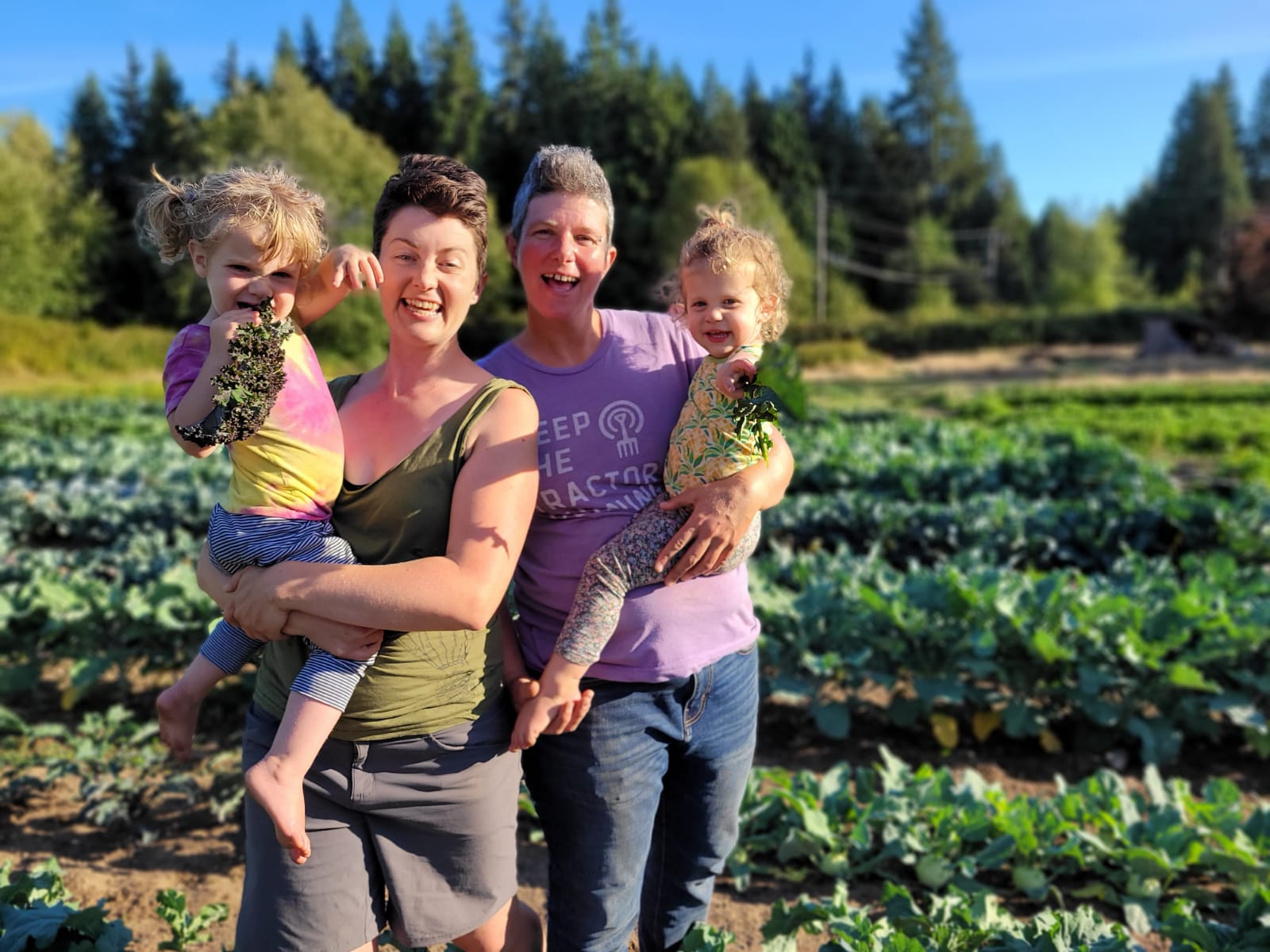
Community has been more important to their early success than Mel would ever have dreamed. Between Hannah and Mel, they have an incredible—and complementary—set of skills that are different and complete each other. Mel loves people but describes herself as “a blunt Quebecer who tells it like it is, which doesn’t always fly on the coast,” while she says “Hannah has this incredible way to put things in words. She’s spent a lot of time building who we are for the community.”
They landed in a new place mid-winter with small children. “We only had so much time to go around mingling and meeting people,” Mel says. Hannah spent the winter building the farm’s website and social media, telling their story. Coming from a teaching farm where Hannah was running a volunteer program, they wanted to open up their new farm to folks wanting to connect with the land. Between the pandemic and working from home, people were “aching to get out into nature. Our story spread like wildfire and we got so many volunteers. Our investor came out of that, too.”
A handful of the folks who started coming in that first year are still coming—“they are really committed and became our community,” Mel says. “We call them friends, we know everything about each other from weeding.” Mel has lived in small communities before, and knows that when you’re new somewhere you have to prove yourself. “People have to ask themselves, ‘Am I going to invest energy in building a relationship with this person?’ I think we’re in the book now!”
Overall, they have found that the community has been very welcoming. “Despite the fact that it’s small here, it’s mighty,” Mel says. “The farmers we’ve met have been very supportive. We can borrow from each other when we run out of pint containers, for example.” This kind of collaboration is especially essential because the Sunshine Coast is not in an agricultural area, and there’s a ferry between them and any supplies.
Community extends beyond their neighbours on the Sunshine Coast. Grounded Acres is certified organic. “The community that raised me as a farmer in BC was the certified organic community,” Mel says. “At a really young farmer age, I got into the importance of organic, and the importance of that community in itself.” Mel went to her first BC Organic conference her first year farming in BC. “It’s always a highlight of my year, not necessarily what I’m learning but who I’m connecting with, who I’m getting to rant with, have a beer with. That precious moment that every farmer needs, to feel that you’re not alone.”
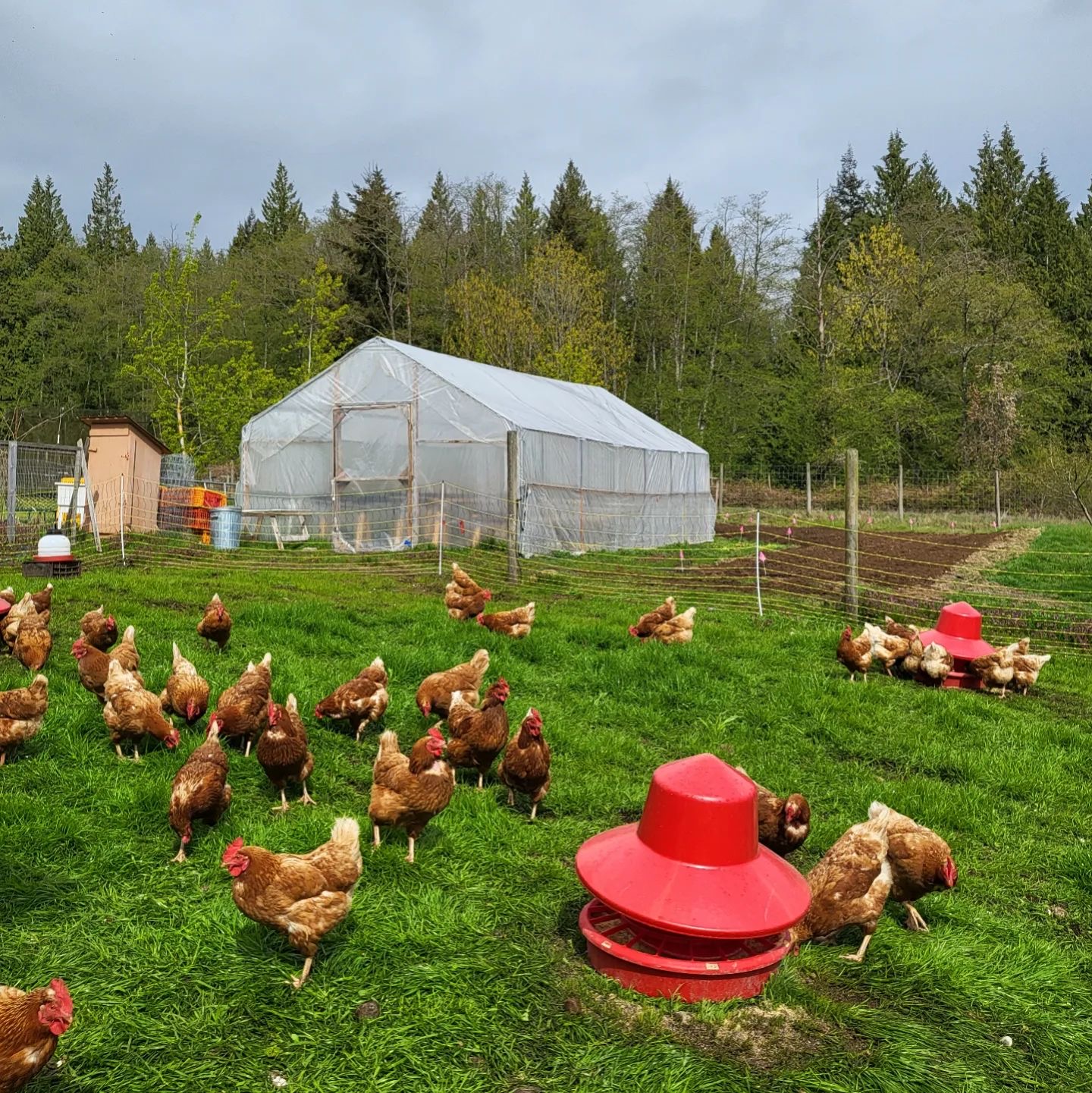
For Mel, being certified organic is about more than just what organic means. “At the end of the day we can make those practices happen without having certification, but certification is investing in keeping that community alive, that one thing that gives us a voice, makes us visible, makes us not just a trend.” The organic community in BC specifically has been together for many years, and Mel has “so much respect for the folks that put that system together, and the folks keeping it together.”
While there’s no one recipe to farming, Mel and Hannah have certainly pulled together many key ingredients, from their diverse skills to the people who support their farm in many different ways. “Diversity in the field, diversity in skills” is important, Mel says. “The jack-of-all-trades farmer thing is romanticized a lot, but it’s a harsh reality.” Bringing multiple skill sets and interests to the field is so important—even if someone is just looking for a business partner, don’t look for people who like doing the same things you do, Mel recommends.
“That’s one thing I appreciate about our farm every day. Hannah will put time into doing wholesale with chefs and going to market on the weekend. My favourite thing is to be alone on the farm, and she comes back so excited, it feeds her—and that in turn feeds me.” The foundation of Grounded Acres is the relationship between Mel and Hannah, “romantic partners who are good business partner matches as well, how lucky we are!”
Darcy Smith is the editor of the BC Organic Grower, and a huge fan of organic farmers. She also manages the BC Land Matching Program delivered by Young Agrarians.
Feature image: Queer community setting up tomato tunnels. Credit: Grounded Acres Organic Farm.


